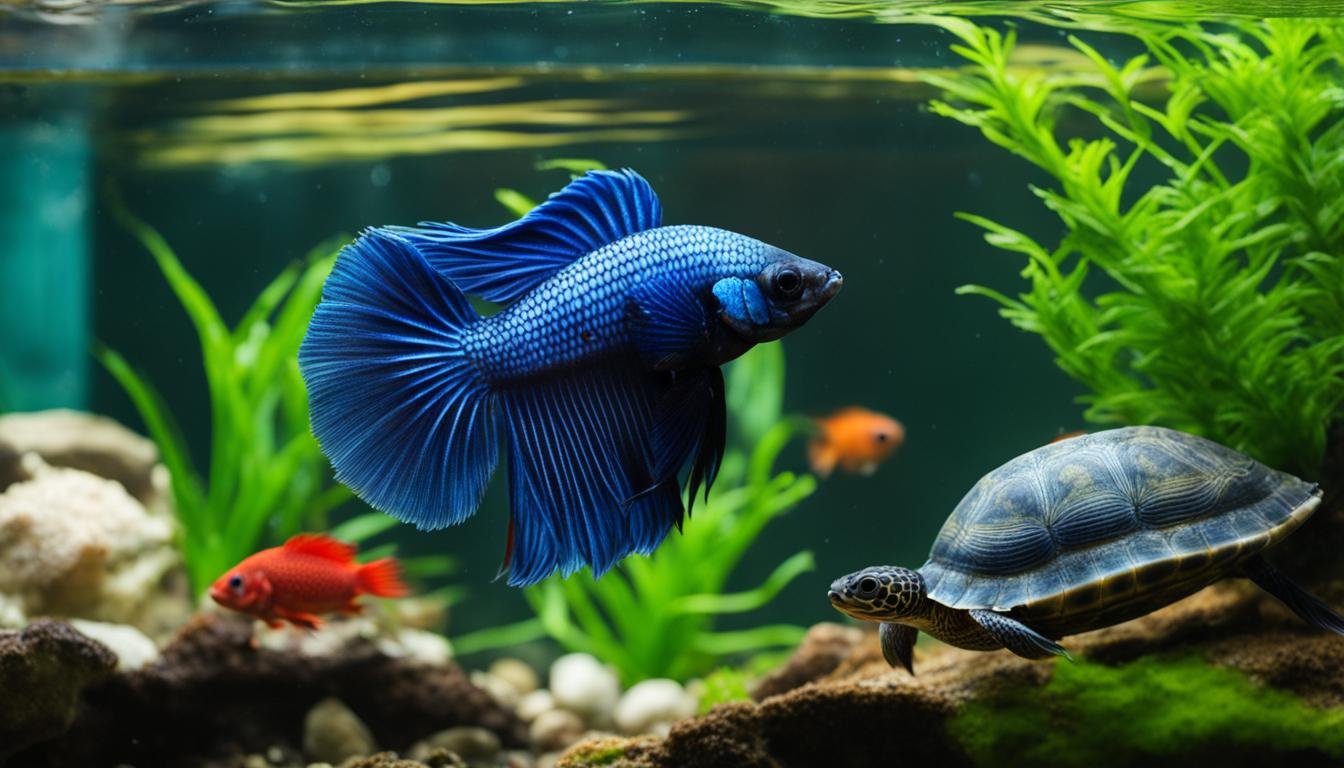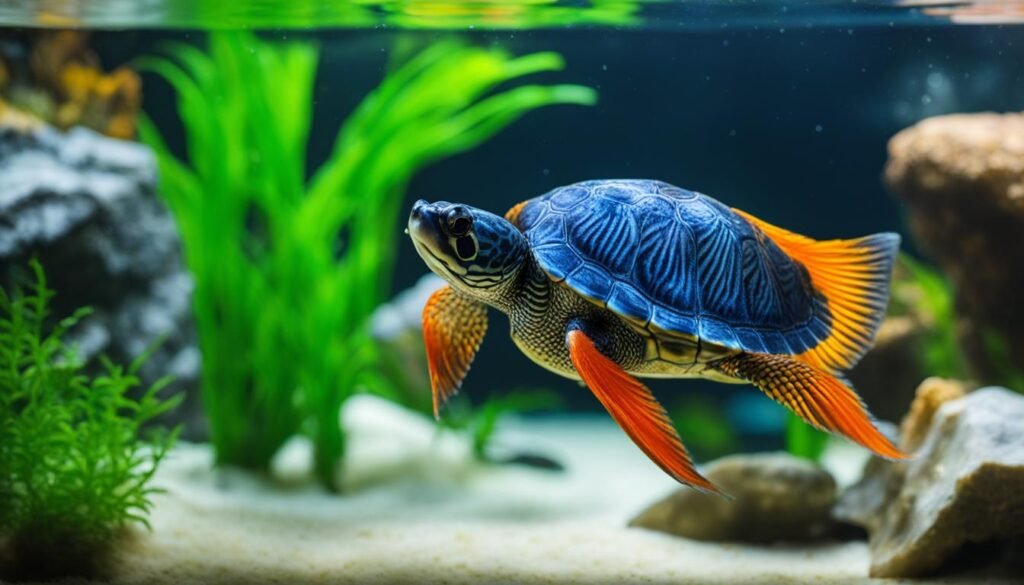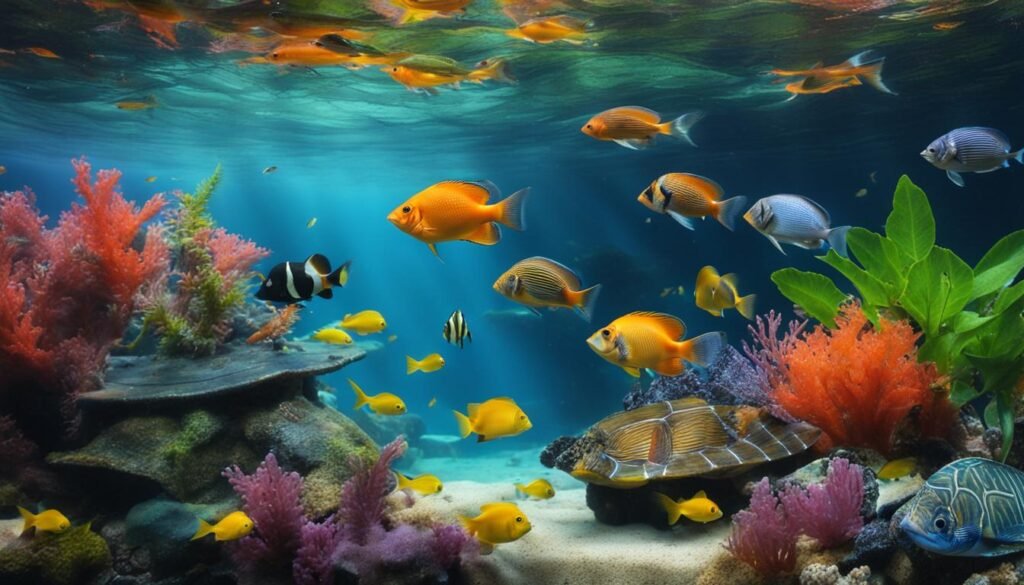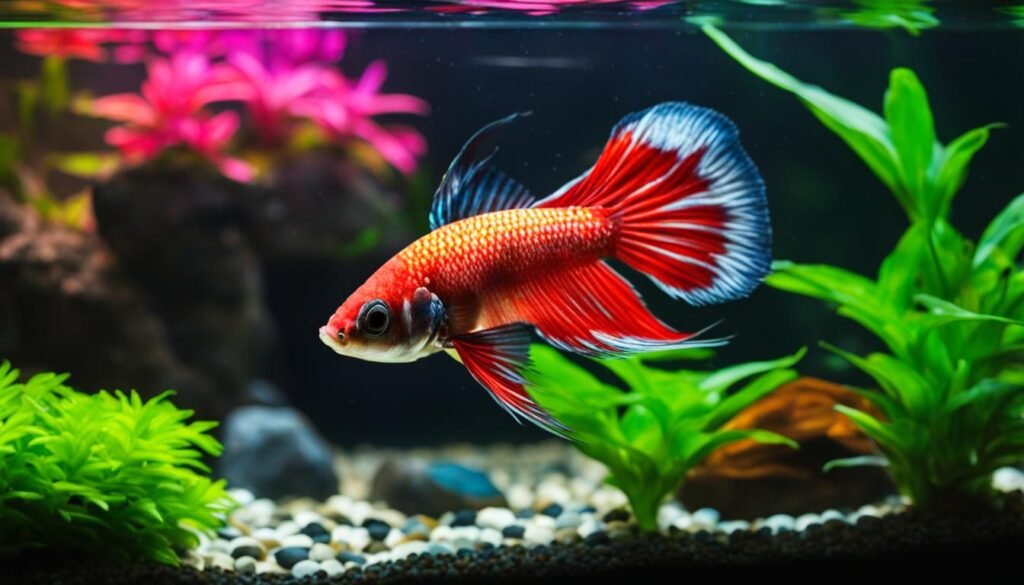Your cart is currently empty!

Can Betta Fish Live With Turtles: Understanding Compatibility and Tank Conditions
While it may be tempting to try and keep betta fish and turtles together in the same tank, it is not recommended. The reasons for this include differences in diet, space requirements, water parameters, and the potential for aggression. Turtles are omnivores and may see betta fish as food, leading to injury or death. Turtles also require larger tanks compared to bettas, and have different temperature and filtration needs. It is best to keep betta fish and turtles in separate tanks to ensure their overall well-being.
Key Takeaways:
- Betta fish and turtles are not compatible tank mates due to differences in diet, space requirements, and water parameters.
- Turtles are omnivores and may view betta fish as prey, leading to potential aggression and harm.
- Turtles require larger tanks and different temperature and filtration needs compared to betta fish.
- Alternative tank mates can be considered for both betta fish and turtles, but compatibility and tank size should be carefully considered.
- Providing separate tanks for betta fish and turtles ensures their well-being and overall health.
Diet Differences Between Betta Fish and Turtles
When considering the compatibility of betta fish and turtles in the same tank, one important factor to consider is their diet. Betta fish and turtles have significantly different dietary needs and preferences.
Betta fish are carnivorous and primarily consume protein-based foods. Their diet consists of high-quality betta pellets, freeze-dried or frozen bloodworms, and other small live or frozen foods. They have a small stomach and need to be fed small amounts several times a day.
On the other hand, turtles are omnivores and require a varied diet. They eat a combination of plant matter, insects, larvae, and even small fish. Turtles may see betta fish as potential prey and may exhibit aggressive behavior towards them. This can lead to stress, injury, or even death for the betta fish.
To ensure the well-being of both betta fish and turtles, it is best to provide them with separate tanks and meet their specific dietary requirements.
Betta Fish and Turtles: Housing Considerations
When it comes to keeping betta fish and turtles together, it’s important to understand the housing requirements for each species. While it may seem convenient to have them in the same tank, it’s not advisable due to their different needs.
Betta Fish Tank Size
Betta fish are known for their vibrant colors and flowing fins, but they don’t require a large tank. A 5-10 gallon tank is sufficient for a single betta. It’s important to provide them with hiding spots, such as plants or caves, to help them feel secure.
Turtle Tank Size
Turtles, on the other hand, require a larger tank to thrive. Most turtle species need tanks of at least 50-100+ gallons, depending on their size. This allows them room to swim, bask, and explore their surroundings. Turtles also require a dry area or basking platform where they can rest and warm themselves under a heat lamp.
Betta Fish and Turtles in the Same Tank
Considering the significant difference in tank size requirements between betta fish and turtles, it’s best to keep them in separate tanks. The size difference can create stress for the betta fish and potential aggression from the turtle. Providing the proper housing for each species will ensure their overall well-being and reduce the risk of any harm or conflict.
Differences in Water Parameters for Betta Fish and Turtles

When considering the compatibility of betta fish and turtles in the same tank, it’s important to understand the differences in their water parameters and tank conditions. Each species has specific requirements that must be met in order for them to thrive.
Betta Fish Water Parameters
For betta fish, maintaining the right water temperature is crucial. They prefer temperatures between 78-80°F, which falls within the tropical aquarium range. It’s important to monitor and adjust the water temperature accordingly to ensure the comfort and well-being of your betta fish.
Betta fish also require clean and well-filtered water. They are quite sensitive to water quality, particularly to high levels of ammonia. Regular water changes and proper filtration are necessary to keep their tank conditions optimal.
Turtle Water Parameters
Turtles, on the other hand, have different water temperature requirements. They typically need higher temperatures ranging from 75-85°F, depending on the species. Providing a basking area with a heat lamp or pad is essential to help turtles regulate their body temperature.
Turtles are known to be messy animals, producing more waste compared to betta fish. This means that their tanks require more frequent cleaning and maintenance to prevent water pollution. A reliable filtration system is necessary to effectively remove waste and maintain water quality.
Tank Conditions for Both Species
Considering the differences in water parameters, it is clear that betta fish and turtles have distinct tank conditions. It is not recommended to keep them together in the same tank due to the challenges of providing suitable water conditions for both species simultaneously.
Filtration and Water Flow Considerations for Betta Fish and Turtles
When it comes to keeping betta fish and turtles together in the same tank, filtration and water flow are important factors to consider. Both species have specific needs and preferences when it comes to the cleanliness and movement of their aquatic environment.
The Importance of Proper Filtration
Betta fish and turtles produce waste that can quickly degrade the water quality if not properly filtered. Turtles, in particular, are known to be messy eaters and can create a substantial amount of waste. Therefore, it is crucial to choose a filtration system that can effectively handle the waste produced by both betta fish and turtles.
For turtles, a powerful filtration system is necessary to maintain the cleanliness of the water. This helps remove excess food particles, waste, and other debris, ensuring a healthy environment for the turtles. However, it is essential to consider the impact of strong water flow on betta fish.
Water Flow and Betta Fish Comfort
Betta fish are naturally found in slow-moving waters such as rice paddies and shallow streams. They have delicate fins that can be easily damaged by strong water flow. Therefore, it is important to choose a filtration system that provides gentle water flow to create a more suitable environment for betta fish.
One option is to use a sponge filter, which allows for biological filtration without creating a strong current. Another option is to adjust the flow rate of a traditional filter by using a valve or baffle to reduce the intensity of the water flow. This helps prevent stress and potential injury to betta fish while still maintaining proper filtration for the tank.
Creating a Balanced Environment
Overall, it is important to strike a balance between the filtration needs of turtles and the water flow preferences of betta fish. By choosing a filtration system that can effectively handle the waste produced by turtles while providing a gentle water flow for betta fish, you can create a healthy and harmonious environment for both species.
Remember to monitor the water parameters regularly and perform routine maintenance to ensure optimal conditions for your betta fish and turtles. With proper filtration and water flow considerations, you can provide the best possible care for both species in their respective tanks.
Fish Species That Can Be Kept With Turtles: Finding Suitable Tank Mates

While betta fish may not be suitable tank mates for turtles, there are several other fish species that can coexist peacefully in the same tank. These fish can add a vibrant and diverse community to your turtle tank. Here are some fish species that are known to be compatible with turtles:
- Guppies: Guppies are small, colorful fish that can handle the occasional nibble from turtles. They are active swimmers and can add movement and energy to the tank.
- White Cloud Mountain Minnows: These small, peaceful fish are hardy and can tolerate a range of water conditions. They can coexist peacefully with turtles and add a playful element to the tank.
- Platies: Platies are another great option for turtle tank mates. They are peaceful, resilient, and come in a variety of colors and patterns. They are also easy to care for, making them an ideal choice for beginners.
- Black Skirt Tetras: These tetras are known for their striking black coloration and flowing fins. They are peaceful and can thrive in a turtle tank as long as there is enough space for them to swim.
Creating a Peaceful Tank Environment
When considering tank mates for your turtles, it’s important to create a peaceful and harmonious environment. Here are some tips to ensure the well-being of both your turtles and their fish companions:
- Choose species that have similar temperature and water parameter requirements as your turtles. This will help maintain stable and suitable conditions for all inhabitants of the tank.
- Provide plenty of hiding places and plants for the fish to retreat to. This will give them a sense of security and reduce stress levels.
- Monitor the behavior of both the turtles and the fish closely. If any aggression or stress is observed, it may be necessary to rehome certain species to ensure the well-being of all tank inhabitants.
- Maintain regular water changes and proper filtration to maintain good water quality. Turtles can be messy eaters, so a clean environment is essential for the health of all tank inhabitants.
By carefully selecting compatible fish species and creating a suitable tank environment, you can provide a thriving and harmonious habitat for both your turtles and their fish tank mates.
Alternative Tank Mates for Betta Fish

If you’re looking to add some companions to your betta fish tank, there are several species that can coexist peacefully with these beautiful fish. It’s important to choose tank mates that are compatible in terms of temperament, size, and water parameters to ensure a harmonious aquarium environment. Here are some options to consider:
Kuhli Loaches
Kuhli loaches are small, peaceful bottom-dwelling fish that can make great tank mates for bettas. They are known for their eel-like appearance and their playful nature. Kuhli loaches prefer to live in groups, so it’s best to keep them in a small group of at least 3-4 individuals. They are nocturnal creatures and spend most of their time burrowing in the substrate, which makes them an interesting addition to your tank.
Ember Tetras
Ember tetras are small, brightly colored fish that can add a splash of color to your betta tank. They are peaceful and non-aggressive, making them ideal tank mates for bettas. Ember tetras prefer to live in schools, so it’s recommended to keep them in a group of at least 6 individuals. They are also relatively hardy and can adapt well to a variety of water conditions.
Malaysian Trumpet Snails
If you’re looking for a unique and useful tank mate for your betta fish, consider adding Malaysian trumpet snails. These snails are known for their ability to burrow in the substrate, helping to prevent the buildup of detritus and keeping your tank clean. Malaysian trumpet snails are peaceful and won’t bother your betta fish. They can also reproduce easily, so be mindful of their population size if you don’t want too many snails in your tank.
Harlequin Rasboras
Harlequin rasboras are small, schooling fish that can add movement and vibrancy to your betta tank. These fish are peaceful and won’t cause any trouble for your betta. Harlequin rasboras prefer to live in groups of at least 6 individuals, so make sure to provide them with a suitable shoal. They are also relatively easy to care for, which makes them a great option for beginner fishkeepers.
Adding compatible tank mates to your betta fish tank can create a more dynamic and visually appealing aquarium. However, always monitor the behavior and well-being of your fish to ensure they are getting along well. Remember to provide adequate hiding places and space for each species, and maintain proper water parameters to keep all your tank inhabitants healthy and happy.
Conclusion
After carefully considering the compatibility between betta fish and turtles, we have concluded that it is best to keep them in separate tanks. While it may be tempting to house these species together, their differences in diet, space requirements, water parameters, and potential aggression make it challenging for them to coexist peacefully.
When it comes to diet, betta fish are carnivorous and primarily eat protein-based foods, whereas turtles are omnivores and have a varied diet that includes plant matter, insects, larvae, and even fish. This difference in dietary needs can lead to competition for food and aggression if they are kept together.
Additionally, turtles require larger tanks, typically ranging from 50-100+ gallons, compared to the 5-10 gallon tanks that betta fish thrive in. The size difference between the two species can cause stress and intimidation for the betta fish, while turtles may become agitated and nip at the betta’s fins, causing harm.
Furthermore, differences in water parameters, such as temperature and filtration, can pose challenges when housing betta fish and turtles together. Turtles require higher water temperatures and more powerful filtration systems to handle their waste, while betta fish prefer cooler temperatures and slower water flow. Meeting the needs of both species in terms of water conditions can be difficult.
In conclusion, while betta fish and turtles may not be compatible tank mates, there are alternative options available for both species. It is important to consider the specific needs and characteristics of each species when choosing tank mates. By creating separate tanks that cater to their individual requirements, we can ensure the well-being and happiness of both betta fish and turtles in our aquariums.
FAQ
Can betta fish live with turtles?
It is not recommended to keep betta fish and turtles together in the same tank due to differences in diet, space requirements, water parameters, and the potential for aggression.
What are the dietary differences between betta fish and turtles?
Turtles are omnivores and require a varied diet including plant matter, insects, larvae, and fish. Betta fish are carnivorous and primarily eat protein-based foods.
What are the space requirements for betta fish and turtles?
Turtles require larger tanks compared to betta fish, ranging from 50-100+ gallons. Betta fish can live comfortably in a 5-10 gallon tank.
What are the differences in water parameters for betta fish and turtles?
Turtles require a higher water temperature, typically between 75-85°F, while betta fish thrive in temperatures between 78-80°F. Turtles also require a basking area and produce more waste.
What should be considered regarding filters and water flow?
Turtles require powerful filtration systems and stronger water flow, which may stress or injure betta fish that prefer slower water flow.
Can turtles have alternative tank mates?
Some suitable tank mates for turtles include box turtles, mud turtles, and musk turtles, as they tend to have less aggressive tendencies towards fish.
Are there alternative tank mates for betta fish?
Yes, some compatible tank mates for betta fish include kuhli loaches, ember tetras, Malaysian trumpet snails, and harlequin rasboras.
Can betta fish and turtles coexist in the same tank?
No, it is best to keep betta fish and turtles in separate tanks to ensure their overall well-being.
Leave a Reply